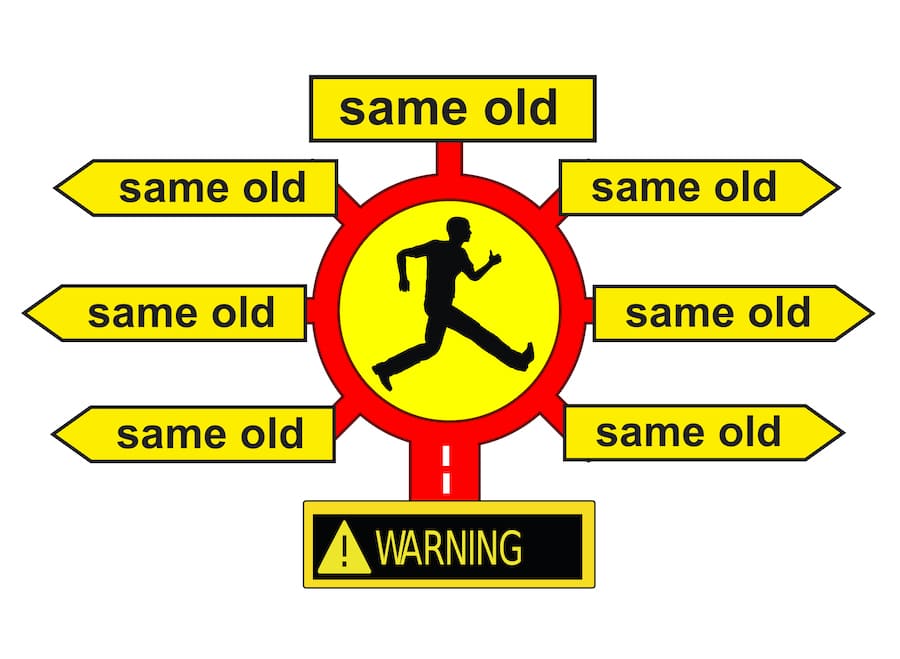I came across a recent article in the Harvard Business Review about feeling overwhelmed and the behaviors that can come along with that feeling. It caught my eye due to the subject matter’s impact on dentists and teams – especially right now.

Running a dental practice and managing your team on top of performing your clinical duties puts an incredible amount of responsibility on your shoulders. The work required to succeed can even seem insurmountable at times. It might feel like you’re struggling to keep your head above water. But it may be of some comfort to know that you are not alone. Most people struggle to avoid the sensation of overwhelm and the anxiety that can arise alongside that sensation.
The article in the HBR addressed this common phenomenon. It’s titled “5 Mistakes We Make When We’re Overwhelmed.”
Quite simply, the article argues that when a person feels overwhelmed, the stress from that sensation compounds the problem by making it difficult to see a way out. Feeling lost or trapped can cause even more stress and lead to more incomplete tasks – a vicious cycle. The author offers several methods to use in the pursuit of relief. These concepts can help you combat the mental fatigue and frustration experienced when you feel like you have too much on your plate.

Overwhelmed Pattern 1: Thinking you Don’t Have Time for Actions that Would Help you
I have so much compassion for the many dentists I speak with that share a complaint: “I just don’t have time…” I most often hear it about training their team, but this lack of time presents itself in many ways. We don’t want to take on a home project until we have enough time and money to find and hire the perfect contractor. Or we fail to work with a coach or therapist because we haven’t found the perfect match. However, most of those moments where you feel like everything is just right don’t happen spontaneously. And when you’re swamped with tasks, it can be challenging to get started on what you know you should do.
Experts suggest that “instead of thinking about what would be ideal, choose the best option that’s easily available to you now.” Start small, and don’t worry about accomplishing a task perfectly. You can’t find your ideal contractor but know a designer who can help you make a room work until you do? Go for that. Need a therapist? Find someone online and get started. It doesn’t have to be a perfect match, and you don’t have to make a big commitment. But understanding that often taking the first step is the biggest hurdle toward some relief will set you on your way. Take enough small steps, and you will find your load will be a lot lighter.
We constantly seek what we think will be the perfect solution. Instead, get started by doing what you can.

Overwhelmed Pattern 2: You Don’t Utilize Your Unconscious Mind
How many brilliant ideas have you come up with while you were in the shower? Or just before falling asleep? Perhaps you were driving but don’t remember the last five minutes of the journey because you were so focused on something and your mind drifted off. “Your unconscious, wandering mind is as valuable a tool for solving problems and creative thinking as your focused mind.”
Allow your mind to wander creatively. You’ll be surprised how often you come up with solutions without the effort and pressure experienced during a workday. Try to figure out situations or times your mind wanders freely and capitalize on the sparks of inspiration that occur.

Overwhelmed Pattern 3: You Interpret Feeling Overwhelmed as a Weakness
The article suggests that we often feel overwhelmed because we lack confidence in ourselves regarding a particular task. Thinking you lack know-how or second-guessing yourself leads to procrastination. That can contribute to anxiety as the mounting weight of an unfinished task weighs us down mentally and emotionally. This weight can lead to being hyper-critical or indulging in negative self-talk that only causes more doubt and insecurity. The article stresses that while this is a normal pattern, you need to resist it taking control. Be compassionate with yourself. And create a plan to pull yourself out of these moments to avoid additional stress and anxiety.

Overwhelmed Pattern 4: You Default to Your Dominant Approaches and Defenses
In simple terms, the article argues that when you’re stressed you will revert to your most structured and familiar way of handling any given situation. “Because we have less cognitive and emotional bandwidth [we fail to] consider other options.” Anyone in a service-based industry will likely recognize this common situation: you are completely swamped with tasks, and someone offers help. To help resolve the situation, all you need to do is take the offer of help and offload a thing or two. But in the anxious or stressed state, your frantic brain won’t allow you to trust anyone else to do the task.
The article provides other examples. Self-reliance can turn into micromanaging or an inability to delegate, and high standards can show up as unrealistic perfectionism. These traits are not inherently bad, but one must ask if the default behavior is appropriate for the task at hand. Could another approach work better?

Overwhelmed Pattern 5: You Withdraw from your Support Systems
When consumed with responsibilities at work, it’s sometimes difficult to make time for the revitalizing support systems and relationships in your personal life. Those that “fill up your emotional cup when you need it most” are critical. Research says that when you are feeling overwhelmed and withdraw from activities with those close to you, it’s “self-sabotaging behavior.” These behaviors can significantly impact your quality of life. Your friends and family will likely notice and react, often negatively.
Losing yourself in work without investing in relationships and a balanced, healthy lifestyle will quickly lead to more stress and burnout. Never forget what is truly important and why you work so hard. Be sure to allocate time for yourself and your family/friends. Figure out ways of investing in your support systems and relationships, even when busy. Explore things like taking a longer lunch one or two days a week to give yourself time with your partner or taking over the bedtime routine with your children. Even walking your dog is an excellent way of nurturing bonds and allowing your overwhelmed mind to wander.
Recognizing when you have too much on your plate is the first step in alleviating your overwhelmed mind. From there, consider the patterns we’ve discussed here. Think about what effort you can make to address the ones most affecting you. With a bit of self-reflection and discipline, you can build constructive habits to help you overcome.
Download our FREE eBook – Dental Practice Excellence – 3 Steps to an All-Star Practice. We explore how minor changes in your approach to training in phone skills and scheduling, along with the positive impact training has on your employees, will help you take your practice productivity to pre-pandemic levels and beyond.









